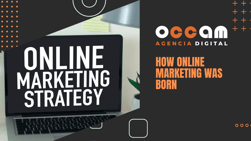Index Content
Martech is the union of Marketing and Technology, i.e. marketing and technology. The term arises from the fusion of both disciplines to the point that the former has practically become dependent on the latter.
Marketing's move from analogue to technological terrain responds to the same trend that every other profession has followed: the simplification and improvement of tasks thanks to the advantages of technology, but also because if customers, individuals, start to surf the internet and use technology, then marketing must do so too.
What is martech?
Martech is defined as the set of strategies, solutions, technological tools and devices that a company or enterprise uses to achieve its commercial and marketing objectives. Martech, in this way, triangulates artificial intelligence, marketing automation and traditional marketing strategies. It is, after all, another dimension of online marketing that has grown exponentially and very recently, because in 2011, a study by the Transylvania University of Brasov counted that only 150 companies used martech in their day-to-day business.
Martech tools
Today we can already say that there are some basic tools that every company uses in its marketing department, although there are variations depending on the type of company, strategies, location, etc. These are the following:
- Monitoring tools: if there is one thing that technology has improved, it is the organisation, planning and management of data. Having an automated record of sales data, customers, campaigns, etc. saves time and costs. In this group we would also include DPM data management tools, responsible for the administration, monitoring and management of stored backups.
- Analysis tools: There is no point, however, in having a large mass of data if it becomes an inaccessible mountain. Analysis tools such as the insights included in most applications.
- CMS: The acronym CMS refers to Content Management System, whose literal translation is Content Management System. A CMS is a software, that is, a computer system, whose functions are to create and enable the operation of a website. It is, to put it simply, a template with many varieties and adaptability that you can use if you want to create a website, whatever it is (blog, online shop...) and has become the basis for creating almost any website. Some examples are Hubspot, Wordpress, Shopify ...
- CRM(Customer Relationship Management): CRM is an acronym for Customer Relationship Management. It is a tool used to manage a company's relationships with its customers. Specifically, it is a software with services dedicated to helping companies manage their relationships with customers effectively, through all kinds of channels, direct and indirect. Although it is not only the computer software itself, but also the entire strategy that is encompassed around it. Through this business strategy, which covers the sales, marketing and customer service departments, the company seeks to optimise the long-term relationship with customers .
- Tag Management Tools
- Emailing platforms: email marketing campaigns, with their own personalisation in each of the cases, have become one of the main advertising tools. Keeping customers informed of news, updates and offers through regular emails. In addition, with the new trend of Permission Marketing, requesting permission from the customer to send this type of email, the company avoids being considered SPAM and the customer is in a much more receptive position.
- Optimisation tools for mobile services
- Redes de publicidad: desde las campañas en redes sociales, hasta la publicidad display, el martech ha abierto una nueva puerta a la publicidad que ha revolucionado por completo el concepto previo. La publicidad siempre ha buscado estar donde está la gente, y si ahora los clientes navegan por la red, ahí es donde deben colocarse los anuncios. Los banners de la publicidad display son los reyes de esta clase de publicidad, aunque se siguen utilizando los métodos tradicionales. De hecho, ha llegado a crearse el término AdTech, derivado del propio Martech, para hacer referencia a estos modos publicitarios que se sirven de la tecnología. Pero, si hay algo que ha cambiado por completo en el AdTech con respecto a la publicidad tradicional es el grado de personalización. Métodos como el remarketing, que se puede aplicar a cualquier forma de publicidad como las newsletter o la publicidad display ya citados, son un avance al que los modos analógicos y físicos no han podido superar.
But if there has been any technological tool that has revolutionised marketing, it has been ecommerce or online commerce: the possibility of moving the entire business from the physical to the technological plane: catalogue, products, purchases, shipments... Through pages created with the aforementioned CMSs, these websites combine all the above elements and many more, such as conversation pop-ups and automatic responses,
To reconcile all of the above we use the term STACK from martech, a collection of MarTech systems that work together to enhance marketing efforts, as if it were an interconnected network of marketing technology tools.




